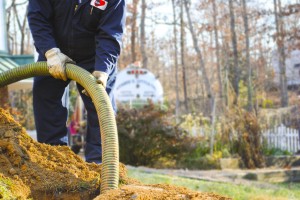When Is the Best Time to Pump Your Septic Tank?
Published on July 9, 2014
 Just because your septic tank seems to be in good working order doesn’t actually mean that it’s in good working order. It’s essential that homeowners make sure that they take good care of their septic systems and that they pump them in order to make sure that they remain in working order. As with most things in life, timing is everything when it comes to taking care of your septic tank.
Just because your septic tank seems to be in good working order doesn’t actually mean that it’s in good working order. It’s essential that homeowners make sure that they take good care of their septic systems and that they pump them in order to make sure that they remain in working order. As with most things in life, timing is everything when it comes to taking care of your septic tank.
How Your Septic Tank Works
Every time you use your septic system, solid waste accumulates at the bottom of the tank to form sludge and lightweight materials float to the top to form scum. If your septic tank was designed the right way, there will be enough space for anywhere from three to five years’ worth of accumulation. Should there ever be too much waste for your tank to handle, solid waste will start escaping into your soil absorption system. When this system becomes clogged, it’s unable to properly adsorb liquid quickly enough and the plumbing can start to become backed up to the surface. Septic pumping and clogged drain cleaning services will be needed for this.
To keep your septic tank in good shape and to prevent backups, it’s best that you have your tank pumped every three years if your home doesn’t have a garbage disposal. If you do have a garbage disposal, it’s recommended that you have your tank pumped every year. So, if you’re planning to get skip bins in the future, you may want to consider this skip bin hire Sutherland Shire for your best preferences!
Have Your Tank Checked Regularly
Besides having septic tank pumping, you should also have your tank inspected every year. Make sure that any plumber who checks your tank is fully licensed by the local Board of Health. During the inspection you’ll have the measurements of your scum and sludge levels taken, and your system’s mechanisms and pipes will be checked as well. The plumber should also take a look at the drain field to see that it’s properly percolating the effluent, which is liquid waste. It’s also a good idea to make sure that you get a detailed receipt of the inspection that lists the date, charges and the number of gallons that were removed from the tank. You’ll also want to ensure that the plumber sends a copy of the receipt to the Board of Health.
Protecting Your Septic Tank
There are a few products that are intended to protect your septic tank between inspections and pumps. These products have special chemicals that are intended to accelerate the sludge breakdown process. One thing to take note of with these special septic-safe products is that there’s a chance that they can ruin the delicate ecosystem in your septic tank that’s taken years to develop. Should this happen, it’s entirely possible that the natural enzymes in your septic tank won’t be able to properly break down waste. It’s up to you whether or not you actually want to use these products. Even if you do, you should still make sure that you schedule regular septic pumping and inspections for your tank.
Learn What You’re Avoiding With Regular Pumps
If you don’t take out time to have your septic tank pumped, you risk your toilets becoming backed up and unprocessed water flowing into the drain field. Your yard can potentially become flooded if enough water manages to seep above ground. Not only that, but the unprocessed water can also potentially find its way to nearby rivers, creeks and other bodies of water. Underneath that the water can contaminate groundwater. Overflowing septic tanks have been known to cause water contamination. It’s essential to address these concerns as outlined in the plumbing guidelines published here to ensure the proper functioning of your septic system.
What Happens to Sludge and Scum When It’s Pumped Out?
Before there were federal laws that prohibited the dumping of septic sludge, the contents of septic tanks were often buried in dump sites. Now, the contents of septic tanks are taken to a special waste treatment plant where they are added to the waste funneled in from municipal sewer systems. There are also companies that specialize in sewage treatment, which can be done at a cesspool. While at these cesspools, the waste is broken down by biological and chemical materials that dissolve the sewage into effluent.
It’s also not unusual to hear of sewage being used to grow food. If the food that you buy doesn’t have an organic label on it, it’s entirely possible that it was grown with the contents found in your septic tank. You might curl your nose at this idea, but it’s an inexpensive fertilizer for farmers. A low water table and good soil combine to act as a filter for the waste.
Now that you know when you should pump your septic tank, why you should pump it and where its contents go when it’s pumped, ask yourself when was the last time you had your tank inspected.
Source:
- http://www.mass.gov/eea/agencies/massdep/water/wastewater/how-often-should-i-pump-out-my-septic-tank.html
- http://home.howstuffworks.com/home-improvement/plumbing/septic-tank-cleaning2.htm